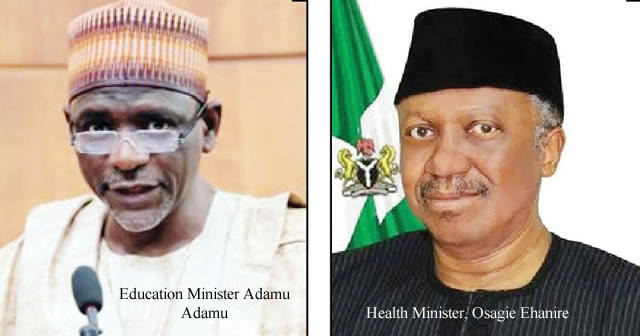By Asmau Ahmad
The Ministry of Health is to collaborate with the Ministry of Education to harmonise the modalities and guidelines for the accreditation of teaching hospitals in Nigerian universities.
The Minister of Health, Dr Osagie Ehanire, during a meeting with the Minister of Education, Malam Adamu Adamu, on Thursday in Abuja, said that both ministries working together was extremely useful.
This, he said, was because health and education were the cornerstones of human capital development, adding that through education, doctors, nurses and all other staff of the health ministry were trained.
Ehanire said that the essence of their meeting was to discuss the possibility of bringing in more hospitals, whether private, state, military, local government owned or even denominational hospitals.
“This is to determine standards that are going to be used for accrediting them to take interns and do housemanship because there are many people who graduated and waiting for position for intern which they don’t get.
“This meeting will help us to expand the positions available for interns,” Ehanire said.
He also said that on the question of residency training, he said that the two ministries were looking at the curriculum to see what needed to be added to the medical studies’ curriculum.
The minister added that the possibility of harnessing the knowledge and skills of Nigerian experts and professors abroad to teach Nigerian doctors virtually or as adjunct professors was also being considered.
“With all the more universities for health sciences growing, we need more lecturers and professors.
“If you don’t have them in the land, we can, through virtual technology, get professors outside the country.
“This will help to improve the quality of training to expand the scope of what we learn, and bring in modern cutting-edge knowledge and technology into the health sector.”
Speaking also, Dr Nnaemeka Nwankanma, Deputy Registrar, Medical and Dental Council of Nigeria (MDCN) said that over the years, there had been some areas of misunderstanding as to how both ministries would contribute to the training of medical doctors in Nigeria.
“So, what we have done here is to try to fine tune and probably harmonise protocols that will allow for seamless training of doctors in Nigeria.
“This is so that both parties will understand that we are equal stakeholders and we have a responsibility to our nation in making sure that the training of these doctors is done along international best practices.
“We are looking at better training of doctors in Nigeria to make them world class,” he added.
Nwankanma said that though both ministries had, in the past, been in partnership over the issue of harmonisation, both ministers were coming together for the first time over the issue.
This, he said, showed political willingness to get things done right while expressing surprised that medical students still found it difficult to get places for internship.
He added that it was necessary to set the minimum criteria required for hospitals to qualify to become teaching hospitals.
Also in his remark, Professor Abubakar Rasheed, the Executive Secretary, National Universities Commission (NUC), urged the two ministries to work closely to improve medical education.
He said that NUC, interacting with the medical educators, had been debating the issue of internship in the last few years.
He also disclosed that in the past five years, all the relevant bodies had been working on the new medicine and dentistry curriculum.
Rasheed said that the curriculum would cover for basic medical sciences and allied health sciences.
“All these we have not started implementing but they have been conceived in the spirit of the best global practice, also looking into our unique Nigerian situation,” he said.


